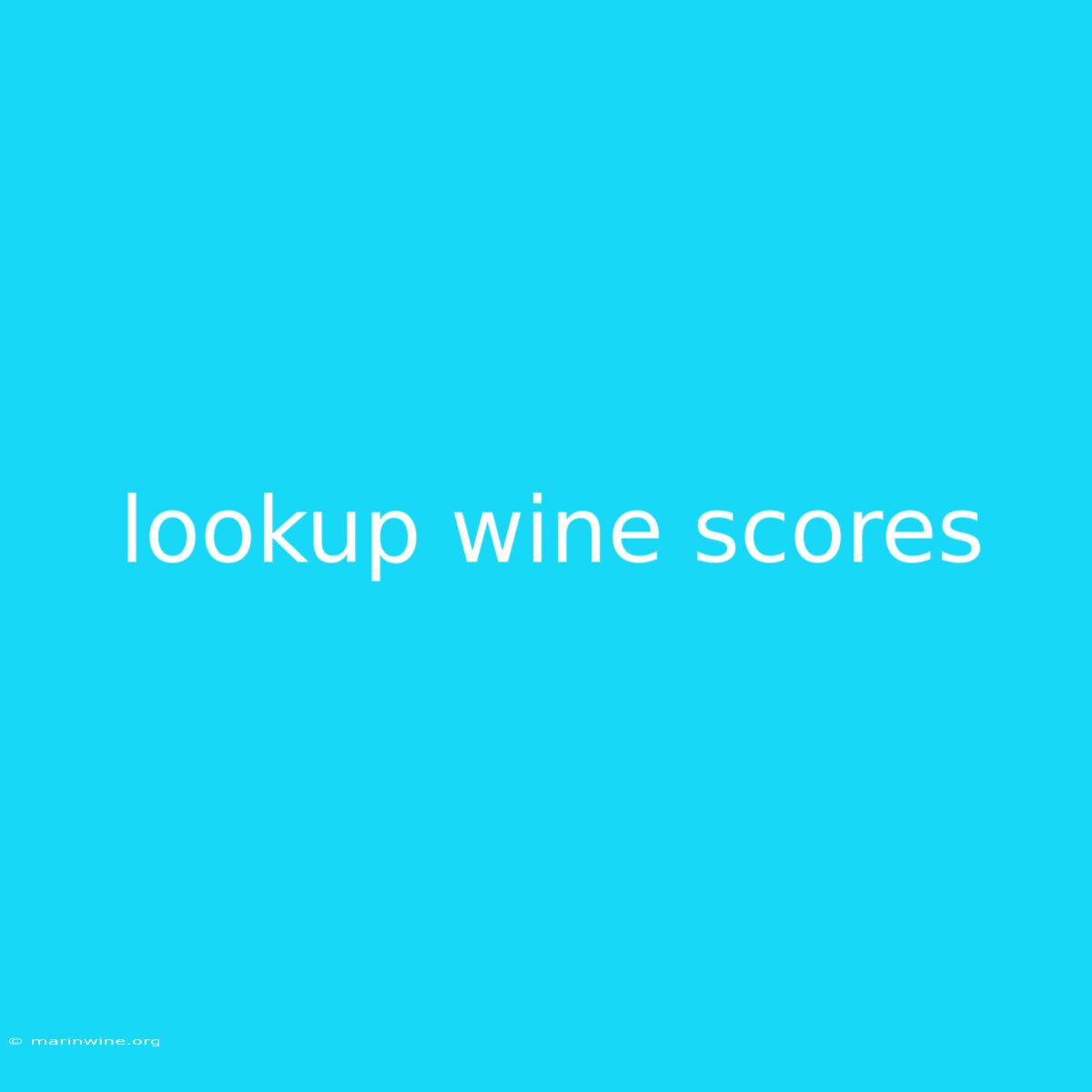Uncorking the Secrets: A Deep Dive into Wine Scores and Their Lookup
Have you ever wondered how wine scores are determined, and what they truly mean? The world of wine can be intimidating, with a dizzying array of labels, regions, and vintages. But fear not, because wine scores offer a helpful guide in navigating this complex landscape. This article will explore the ins and outs of wine scores, delving into their meaning, significance, and limitations.
Why It Matters:
Understanding wine scores is crucial for anyone interested in wine, whether you're a seasoned connoisseur or just starting your journey. These scores provide a valuable benchmark for quality, enabling you to make informed purchasing decisions and discover new favorites. We'll analyze the different rating systems, dissect the factors that contribute to a high score, and provide tips for effectively utilizing this information.
Key Takeaways of Wine Scores:
| Key Takeaway | Description |
|---|---|
| Scores are subjective | Wine scores reflect the individual palate and preferences of the critic, not an objective measurement of quality. |
| Scores offer a starting point | They can guide you towards wines that align with your taste preferences, but your personal experience is the ultimate judge. |
| Scores can vary across critics | Different critics may have different scoring scales and priorities, so comparing scores between systems can be tricky. |
Wine Scores: A Deeper Dive
The Art of Wine Tasting and Scoring
Wine scores are assigned by professional wine critics, who rigorously evaluate wines based on various sensory attributes. These attributes include:
- Appearance: Color, clarity, and intensity
- Aroma: Complexity, intensity, and balance of scents
- Taste: Flavors, acidity, tannins, sweetness, and finish
- Overall Impression: Harmony, complexity, balance, and potential for aging
Each critic may place different emphasis on these elements, resulting in a wide range of scores.
The Major Wine Score Systems
Several prominent rating systems exist, with each having its unique methodology and influence. Some notable systems include:
- Robert Parker's Wine Advocate: Widely recognized, known for its focus on powerful, concentrated wines.
- Wine Spectator: Emphasizes balance and elegance, offering detailed tasting notes.
- Decanter: A British publication, with a focus on quality, value, and accessibility.
The Limitations of Wine Scores
It's essential to remember that wine scores are merely a guide, not a definitive judgment. Factors not reflected in scores can significantly impact your enjoyment, such as:
- Personal Preferences: What one critic finds exceptional might not resonate with another, and vice versa.
- Price and Availability: Scores often don't account for the cost or availability of a wine.
- Vintage Variations: Wine quality can fluctuate greatly depending on the year of harvest.
- Serving Temperature and Food Pairing: These factors can drastically influence the taste and enjoyment of a wine.
Utilizing Wine Scores Effectively
While scores provide a valuable starting point, ultimately, the best way to discover wines you love is to explore and experiment. Here are some tips for navigating the world of wine scores:
- Read the tasting notes: These provide a more detailed account of the wine's characteristics than the score alone.
- Compare scores across different systems: Getting a broader perspective can help you understand the consensus around a wine.
- Don't be afraid to try something new: Explore wines that are outside your comfort zone, and discover hidden gems.
- Trust your own palate: The ultimate judge of a wine's quality is your own personal preference.
FAQ for Wine Scores
Q1: Are high scores always indicative of high quality? A1: Not necessarily. A high score simply indicates that the critic enjoyed the wine based on their individual preferences.
Q2: How do I find wine scores online? A2: Many websites offer comprehensive wine databases with scores, such as Wine-Searcher, Wine Spectator, and Wine Advocate.
Q3: What is the difference between a 90-point wine and a 95-point wine? A3: A 90-point wine is considered very good, while a 95-point wine is exceptional. However, the difference in quality can be subtle and subjective.
Q4: Can I trust wine scores to help me find a good value wine? A4: Wine scores can be helpful in finding value, but they often don't account for the price. Look for scores from critics known for their value-oriented reviews.
Q5: How do I use wine scores to find wines that I will enjoy? A5: Start by exploring wines with scores that align with your general taste preferences (e.g., fruity, earthy, full-bodied).
Q6: Should I avoid wines with low scores? A6: Not necessarily. Low scores don't mean a wine is bad, it may simply not meet the critic's preferences. Explore wines with lower scores and see if you enjoy them.
Tips for Using Wine Scores
Tip 1: Research different critics and their scoring styles to understand their personal preferences. Tip 2: Read tasting notes from multiple critics to get a balanced perspective on a wine. Tip 3: Use scores as a starting point, but ultimately, your personal taste is the best guide. Tip 4: Don't be afraid to venture beyond highly rated wines and explore less familiar regions or producers. Tip 5: Consider wine scores alongside other factors like price, availability, and food pairing potential.
Summary by Wine Scores
Exploring the world of wine scores is a valuable exercise for any wine enthusiast. By understanding how they're determined, their significance, and their limitations, you can make informed choices and discover wines you'll love. Remember, scores are merely a tool to guide your journey, but your own palate is the ultimate compass. Embrace exploration, experiment with different wines, and enjoy the exciting world of wine!

